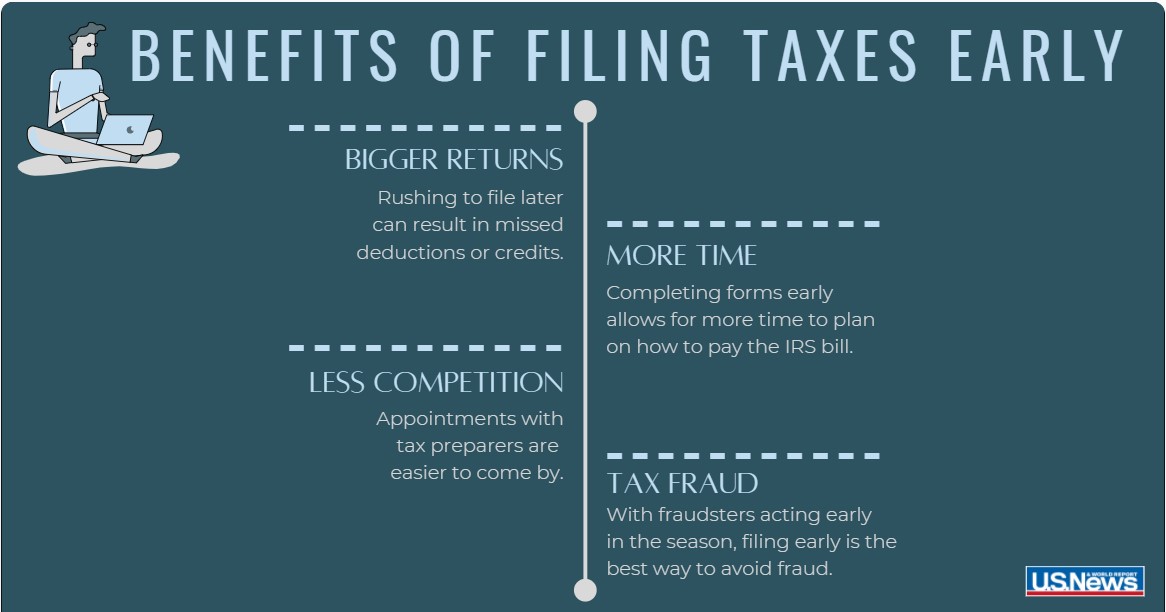FOR MILLIONS OF Americans, there is no getting around the need to file an annual tax return. Last year, because of the COVID-19 pandemic, the IRS gave everyone until July to file their tax returns. While a similar extension hasn't been announced for this year, you won't have to submit your forms until April 15. What's more, those requesting an extension can take up to Oct. 15 to file their forms, although any taxes owed are still due in April.
This year, filing early means February. The IRS will begin accepting returns for the 2020 tax year on Feb. 12, 2021. Just because you can wait to file doesn't mean you should, though. Filing early can mean a more accurate return, more time to pay a tax bill and a reduced chance of being a victim of tax-related identity theft. Plus, for those with simple tax returns, there really is no reason to wait.
"There's not any issue with filing your return early," says Jeff Donham, a wealth advisor with The Colony Group in Richmond, Virginia. He says any filing in February is generally considered early.
Keeping reading to learn why you should consider filing early, what documentation you'll need and how early filing prevents tax identity theft.
Benefits of Filing Taxes Early
There are several reasons to complete tax returns early rather than waiting until Tax Day:
- More accurate returns potentially resulting in larger refunds.
- Less competition for appointments with tax preparers.
- More time to plan for tax payments.
- Less chance of tax fraud.

"Obviously, if you have a refund, you'll get it earlier," says Paul Joseph, an attorney and CPA with Joseph & Joseph Tax & Payroll in Williamston, Michigan. For many people, that alone may be reason enough to file early.
People who file early may be in line for a larger refund too. That may be because those filing near the tax deadline are often rushing to complete their paperwork and could miss valuable deductions or credits. "If you do it in haste, you often overlook things," Joseph says.
For those who owe money to the IRS, completing tax forms early provides time to plan for how to pay the bill. Even if a tax return is filed early, payment isn't due until Tax Day, which is April 15 this year.
Appointments with tax professionals may be hard to come by during the final weeks before the tax-filing deadline. Making an early appointment could mean you are able to meet at a convenient time, and your return won't have to compete for your tax preparer's attention.
However, one of the biggest reasons to file as soon as possible is to avoid tax fraud, says Marianela Collado, CEO and senior wealth advisor at Tobias Financial Advisors in Plantation, Florida.
Fraudsters use stolen Social Security numbers to create phony returns and file them early in the tax season. If they aren't flagged for review by the IRS, the return is processed and a refund issued. Then, when the legitimate taxpayer tries to file his or her return, the system rejects it. The result can be a protracted process in which an affidavit must be completed, supporting documentation provided and a paper return filed.
The best way to avoid being a victim of tax identity theft is to file your return as soon as possible.
When Is the Earliest I Can File My Tax Return?
Although the IRS will begin accepting returns for the 2020 tax year on Feb. 12, 2021, not everyone will be able to file then.
Employers have until Jan. 31, 2021 to mail out W-2 forms, which record worker wages, tax withholding and other data that is crucial for tax filings. The same deadline applies for 1099 forms, which are sent to independent contractors or used for nonwage sources of income such as interest or disbursements from retirement accounts. Meanwhile, those who own pass-through entities such as a partnership or S-corporation may not get tax forms for their business income until March.
"We usually tell our clients to wait until late February or even March to file," Donham says. Many of his firm's clients have brokerage accounts, and tax statements from investment firms are often not mailed until mid-February. While a return can always be amended, filing a change can be costly and time-consuming, according to Donham.
What Do I Need to File My Taxes Early?
Depending on the complexity of your income and tax situation, you may need the following documents, among others, before you can file your return:
- W-2 forms from wage-earning jobs.
- 1099 forms from independent contractor or gig work.
- 1099 forms from retirement, brokerage or dividend income.
- Mortgage and property tax statements for itemizing deductions.
- Charitable donation receipts and copies of medical bills for itemizing deductions.
- Business expense receipts for Schedule C business deductions.
- K-1 form for partnership income.
Eric Bronnenkant, head of tax for online advisory firm Betterment, suggests people ask themselves these questions: "Where do I have all my money and where did I generate (income)?" The answers will help determine which tax forms may be coming your way.
For those who use tax software, there is no reason to wait to start inputting information prior to Feb. 12 if all documents have been received. "You can get everything in there, but it's not going to be transmitted (until Feb. 12)," Collado says.
How to Avoid Tax Fraud
Although the IRS has taken steps to curtail tax-related identity theft, the practice is still prevalent. Fortunately, those who can't file early may have other options to deter fraud.
The IRS offers a transcript service that lets taxpayers review activity on their record. This method doesn't prevent identity theft, but it helps taxpayers proactively address problems rather than finding out about fraud when filing their return.
Using an identity protection PIN offers another layer of security against fraud. In the past, the federal government only issued PINs to those who were victims of tax identity theft and those who lived in specific states. However, starting in 2021, anyone can opt into the program. Be aware that once you request a PIN, you must use one to file every year.
If you'd prefer not to use a PIN, filing as early as possible remains one of the best ways to avoid being a victim of tax identity theft.
This article was originally published By Maryalene LaPonsie, money.usnews.com.











